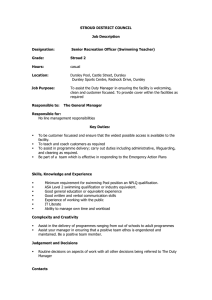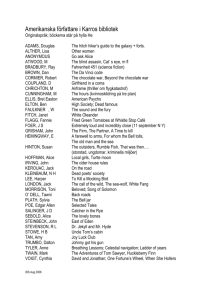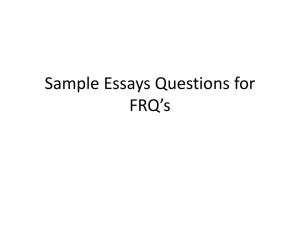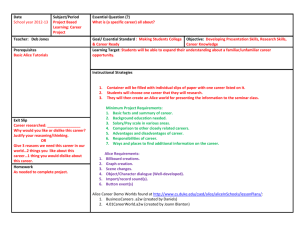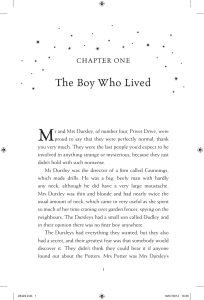Selection of texts - The George Washington University
advertisement
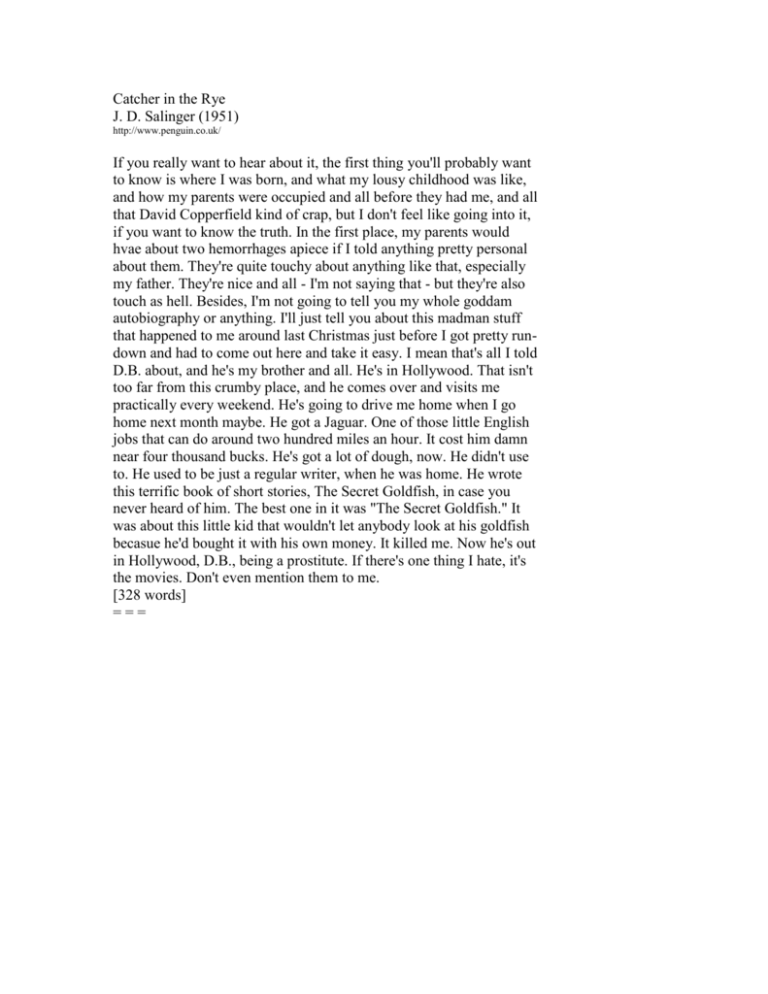
Catcher in the Rye J. D. Salinger (1951) http://www.penguin.co.uk/ If you really want to hear about it, the first thing you'll probably want to know is where I was born, and what my lousy childhood was like, and how my parents were occupied and all before they had me, and all that David Copperfield kind of crap, but I don't feel like going into it, if you want to know the truth. In the first place, my parents would hvae about two hemorrhages apiece if I told anything pretty personal about them. They're quite touchy about anything like that, especially my father. They're nice and all - I'm not saying that - but they're also touch as hell. Besides, I'm not going to tell you my whole goddam autobiography or anything. I'll just tell you about this madman stuff that happened to me around last Christmas just before I got pretty rundown and had to come out here and take it easy. I mean that's all I told D.B. about, and he's my brother and all. He's in Hollywood. That isn't too far from this crumby place, and he comes over and visits me practically every weekend. He's going to drive me home when I go home next month maybe. He got a Jaguar. One of those little English jobs that can do around two hundred miles an hour. It cost him damn near four thousand bucks. He's got a lot of dough, now. He didn't use to. He used to be just a regular writer, when he was home. He wrote this terrific book of short stories, The Secret Goldfish, in case you never heard of him. The best one in it was "The Secret Goldfish." It was about this little kid that wouldn't let anybody look at his goldfish becasue he'd bought it with his own money. It killed me. Now he's out in Hollywood, D.B., being a prostitute. If there's one thing I hate, it's the movies. Don't even mention them to me. [328 words] === Alice’s Adventures in Wonderland Lewis Carroll (1865) http://www.gutenberg.org Alice was beginning to get very tired of sitting by her sister on the bank, and of having nothing to do: once or twice she had peeped into the book her sister was reading, but it had no pictures or conversations in it, `and what is the use of a book,' thought Alice `without pictures or conversation?' So she was considering in her own mind (as well as she could, for the hot day made her feel very sleepy and stupid), whether the pleasure of making a daisy-chain would be worth the trouble of getting up and picking the daisies, when suddenly a White Rabbit with pink eyes ran close by her. There was nothing so very remarkable in that; nor did Alice think it so very much out of the way to hear the Rabbit say to itself, `Oh dear! Oh dear! I shall be late!' (when she thought it over afterwards, it occurred to her that she ought to have wondered at this, but at the time it all seemed quite natural); but when the Rabbit actually took a watch out of its waistcoat-pocket, and looked at it, and then hurried on, Alice started to her feet, for it flashed across her mind that she had never before seen a rabbit with either a waistcoatpocket, or a watch to take out of it, and burning with curiosity, she ran across the field after it, and fortunately was just in time to see it pop down a large rabbit-hole under the hedge. In another moment down went Alice after it, never once considering how in the world she was to get out again. The rabbit-hole went straight on like a tunnel for some way, and then dipped suddenly down, so suddenly that Alice had not a moment to think about stopping herself before she found herself falling down a very deep well. [313 words] Harry Potter and the Philosopher’s/Sorcerer’s Stone. J. K. Rowlings (1997) http://soft.rosinstrument.com/ Mr. and Mrs. Dursley, of number four, Privet Drive, were proud to say that they were perfectly normal, thank you very much. They were the last people you'd expect to be involved in anything strange or mysterious, because they just didn't hold with such nonsense. Mr. Dursley was the director of a firm called Grunnings, which made drills. He was a big, beefy man with hardly any neck, although he did have a very large mustache. Mrs. Dursley was thin and blonde and had nearly twice the usual amount of neck, which came in very useful as she spent so much of her time craning over garden fences, spying on the neighbors. The Dursleys had a small son called Dudley and in their opinion there was no finer boy anywhere. The Dursleys had everything they wanted, but they also had a secret, and their greatest fear was that somebody would discover it. They didn't think they could bear it if anyone found out about the Potters. Mrs. Potter was Mrs. Dursley's sister, but they hadn't met for several years; in fact, Mrs. Dursley pretended she didn't have a sister, because her sister and her good-for-nothing husband were as unDursleyish as it was possible to be. The Dursleys shuddered to think what the neighbors would say if the Potters arrived in the street. The Dursleys knew that the Potters had a small son, too, but they had never even seen him. This boy was another good reason for keeping the Potters away; they didn't want Dudley mixing with a child like that. When Mr. and Mrs. Dursley woke up on the dull, gray Tuesday our story starts, there was nothing about the cloudy sky outside to suggest that strange and mysterious things would soon be happening all over the country. Mr. Dursley hummed as he picked out his most boring tie for work, and Mrs. Dursley gossiped away happily as she wrestled a screaming Dudley into his high chair. None of them noticed a large, tawny owl flutter past the window. [340 words] Sweeping Health Care Plan Passes House By CARL HULSE and ROBERT PEAR (Nov. 8, 2009) http://www.nytimes.com WASHINGTON — Handing President Obama a hard-fought victory, the House narrowly approved a sweeping overhaul of the nation’s health care system on Saturday night, advancing legislation that Democrats said could stand as their defining social policy achievement. After a daylong clash with Republicans over what has been a Democratic goal for decades, lawmakers voted 220 to 215 to approve a plan that would cost $1.1 trillion over 10 years. Democrats said the legislation would provide overdue relief to Americans struggling to buy or hold on to health insurance. “This is our moment to revolutionize health care in this country,” said Representative George Miller, Democrat of California and one of the chief architects of the bill. Democrats were forced to make major concessions on insurance coverage for abortions to attract the final votes to secure passage, a wrenching compromise for the numerous abortion-rights advocates in their ranks. Many of them hope to make changes to the amendment during negotiations with the Senate, which will now become the main battleground in the health care fight as Democrats there ready their own bill for what is likely to be extensive floor debate. Democrats say the House measure — paid for through new fees and taxes, along with cuts in Medicare — would extend coverage to 36 million people now without insurance while creating a government health insurance program. It would end insurance company practices like not covering pre-existing conditions or dropping people when they become ill. Republicans condemned the vote and said they would oppose the measure as it proceeds on its legislative route. “This government takeover has got a long way to go before it gets to the president’s desk, and I’ll continue to fight it tooth and nail at every turn,” said Representative Kevin Brady, Republican of Texas. “Health care is too important to get it wrong.” On the House floor, Democrats exchanged high-fives and cheered wildly — and Republicans sat quietly — when the tally display showed the 218th and decisive vote, after the leadership spent countless hours in recent days wringing commitments out of House members. [...] [341 words]
